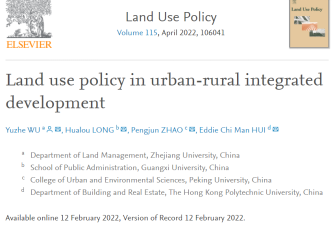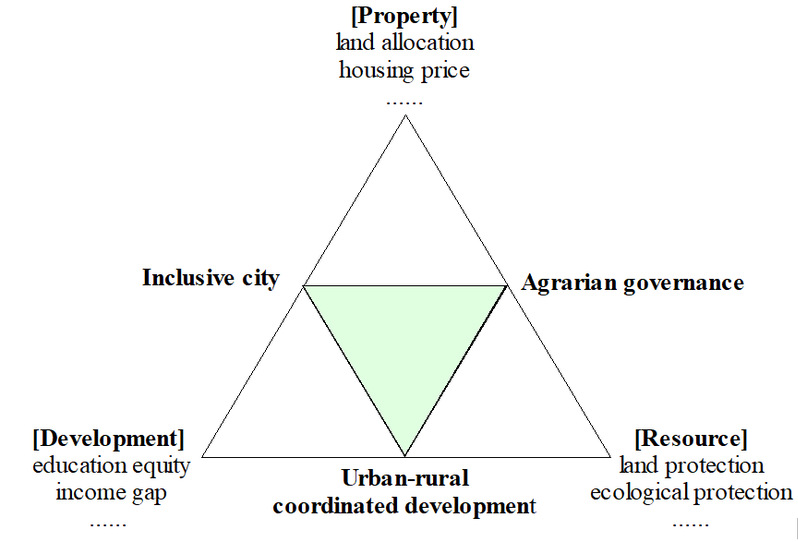Against the background of rapid economic development and global population growth, the process of urbanization is accelerating. The progress of urbanization and industrialization has changed the rural industrial structure and promoted the transfer of population, capital, land, and other key elements of rural development. The relationship between rural people and land has become increasingly complex. Rural development has entered a new stage of transformation and upgrading. Therefore, the urban-rural integrated development has become an important frontier subject. The special issue of Land Use Policy in Urban-Rural Integrated Development co-edited by Prof. Wu Yuzhe, Guangxi University, Prof. Long Hualou, Peking University, Prof. Zhao Pengjun and Prof. Xu Zhiwen of Hong Kong Polytechnic University, is a perfect conclusion. The special issue of Land Use Policy in Urban-Rural Integrated Development, co-edited by Prof. Long Hualou of Guangxi University, Prof. Zhao Pengjun of Peking University, and Prof. Xu Zhiwen of Hong Kong Polytechnic University, was published online successfully.

This special issue is the collective outcome of the Land Policy SSCI Journal Forum. It is also the third special issue on land use policy for urbanization in China, following the "Land Use Policy for Urbanization in China" in Habitat International in June 2018 and "Urban Regeneration and Re-use: China and Europe" in Cities in July 2020. This special issue follows the Urban-rural Coordinated Development and Land Use Policy conference held in April 2019, and received over 100 papers from a global open call. After blind review by Elsevier, 22 papers with theoretical depth and practical significance were included. The special issue focuses on new urbanization and rural revitalization in the context of integrated urban-rural development, and is divided into three themes (as shown in Figure 1): inclusive city, agrarian governance, and urban-rural coordinated development. These three themes include conflict interactions among resources, property rights and development: resource conflicts include cultivated land protection and ecological protection; property rights conflicts include land allocation and housing prices; development conflicts include education equity and income disparity.

The theme of inclusive cities emphasizes that the essence of new urbanization is the inclusiveness of cities. It focuses on the management of urban industrial land, and takes housing as the core of the study, exploring the urban housing problems of different income groups from three perspectives: housing prices, guaranteed housing, and housing subsidies. In the meantime, the relationship between spatial equity, fair competition in land market and sustainable development of urban society under urban renewal is also explored.
The theme of agrarian governance is centered on the issues of rural land property rights and cultivated land protection. The paper proposes to combine ecosystem services with cultivated land protection and functional zoning. It also discusses and reviews land property rights from the perspectives of historical inheritance, fragmentation of farmland property rights as well as rural residential land rights. The paper points out that rural revitalization, post-disaster reconstruction and rural entrepreneurship all need to be considered as core parts of the relationship between government, enterprises and farmers, and that the agrarian governance is faced with strategic choices between top-down or bottom-up.
The theme of urban-rural integrated development focuses on the competition and symbiosis between urban and rural areas. The theme constructs a theoretical framework related to land use transformation based on rural transformation and urban-rural integrated development. Based on the people-oriented concept, the theme studies important issues such as land ticket transaction, how to narrow the income gap between urban and rural areas, how to improve social security of landless farmers, how to equalize public services between urban and rural areas as well as how to promote urban and rural employment.
According to the editorial of the special issue, with the rise of ecological civilization, the public and academia need to discuss whether the concept of ruralization will become a new utopia. In a sense, urban-rural integrated development is a new way to balance urbanization and ruralization. At the end of the editorial, the editor-in-chief quotes a passage from the Tao Te Ching to confirm that urban and rural problems should be balanced and solved through urban-rural integration.


